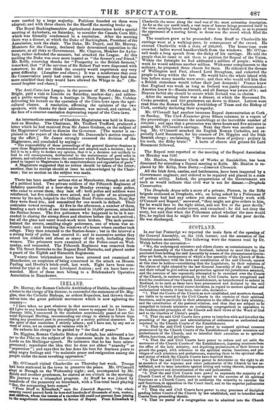IRELAND.
Dr. Murray, the Roman Catholic Archbishop of Dublin, has addressed a letter to the clergy of his diocese, to contradict the statement of Dr. Hig- gins, that the Catholic Bishops, as ardent Repealers, had thrown them- selves into the great political movement which is now agitating the country- " I have taken no part whatever in that movement ; and in no instance did I give to any human being the slightest reason to suppose that I have. In January 1834, I concurred in the resolution unanimously passed at our Ge- neral Episcopal Meeting, recommending our clergy to abstain in future from taking any prominent part in proceedings of a merely political character. To the spirit of that resolution I strictly adhere ; and I have not, by any act or word of mine, set an example at variance with it." He exhorts his clergy to be guided by " the God of peace."
Dr. Higgins, Roman Catholic Bishop of Ardagh, has addressed a let- ter to the Pilot on the subject of the comments made in the House of Lords on his Mullingar speech. He intimates that he has been misre- presented; repudiates the idea that he does not abhor " anarchy " or "separation "; and says that he has done his best for fourteen years to allay angry feelings and "to maintain peace and resignation among the people under the most revolting oppression."
Mr. O'Connell visited Charleville on Thursday last week. Troops had been stationed in the town to preserve the peace. Mr. O'Connell slept at Nenagh on the Wednesday night ; and, accompanied by Mr. Steele and another gentleman, he started at ten o'clock in the morning. His journey was a triumphal progress. At Bruff he was joined by hundreds of the peasantry on horseback, with a Tea-total band playing "See, the conquering hero comes."
"From Bruff to Kilmallock," says the Limerick Reporter, "the whole tount7 round poured forth its tens and hundreds of thousands of men, women, and children, whom the tenon of a coercion bill could not prevent from joining In the magnificent demonstration In favour of Repeal. From KilmiWock to Charleville the scene along the road was of the most animating description. As far as the eye could reach, a vast mass of human beings presented itself to the view, carrying laurels and boughs of trees in their hands, so as to present the appearance of a moving forest, so dense was the crowd which filled the road."
The numbers grew as he proceeded : from Bruff to Charleville his carriage went at a walking-pace, in consequence of the crowd. He entered Charleville with a train of 200,000. The house-tops were crowded ; ladies waved handkerchiefs from the windows. Mr. O'Con- nell made a long speech from the dicky of his carriage. He told the people that, he came to ask them to petition for Repeal of the Union. Within the fortnight he had addressed a million of people ; within a week he would address another million. With some compliments to the military, he proposed three cheers for them. He ridiculed the threats of Wellington and Peel, abused Lord Brougham, and exhorted the people to keep within the law. He would have the whole island with him before many months were over ; and then who would tell him that a British statesman would refuse their just demands ? France knew that England was weak as long as Ireland was justly discontented— America knew it—Russia learned, and all Europe was aware of it ; and Heaven forbid she should be secure while Ireland was in chains.
After the meeting there was a dinner, at which the Reverend Dr. Croke presided, and 350 gentlemen sat down to dinner. Letters were read from the Roman Catholic Archbishop of Tnam and the Bishop of Cork, cordially declaring their sympathy.
Mr. O'Connell had another immense Repeal demonstration at Cork , on Sunday. The Cork Examiner gives fifteen columns to a report of the proceedings ; estimates the assemblage at the incredible number of 500,000 ; and says that a procession was three hours and five minutes in passing Mr. O'Connell's carriage. Next day there was another meet- ing. Mr. O'Connell attacked the English Roman Catholics, and es- pecially Lord Beaumont, for his censure of Dr. Higgins and the Irish Romish clergy ; exclaiming, " He accuses them of perjury : perjury in his teeth, the filthy brute! " A burst of cheers and groans for Lord Beaumont followed.
The Repeal rent reported at the meeting of the Repeal Association on Monday was 709/.
Mr. Hanlon, Ordnance Clerk of Works at Enniskillen, has been dismissed for attending a Repeal meeting at Kells. Mr. Hanlon is re- placed by Mr. Kilby, from Derry.—Limerick Chronicle.
All the Irish forts, castles, and battlements, have been inspected by a Government engineer, and ordered to be repaired and placed in a state of perfect utility. Indeed, the preparations of the Government are such as would indicate that civil war is not far distant.—Drogheda Conservative.
The Drogheda Argus tells a story of a private, Pierson, in the Rifle brigade stationed at Drogheda, who, on being asked by a Policeman if the troops had had any orders yet about some " bloody work with O'Connell and Repeal," answered, "they might not give orders to him, for he would face to the right about, and not fire at the poor devils." The man was placed under arrest, and examined : he did not deny the story, but said that when the Policeman asked whether the men would fire, he replied that he might fire over the heads of the poor devils. He was discharged.


























 Previous page
Previous page